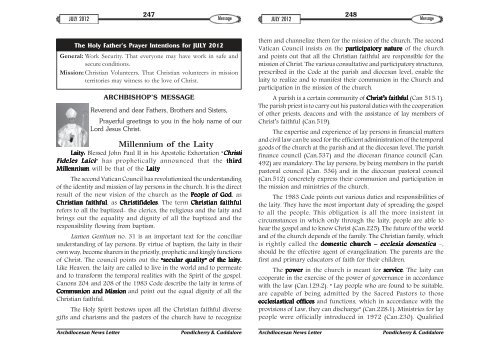rawttakuppam hemerijckx rural centre - Archdiocese of Pondicherry
rawttakuppam hemerijckx rural centre - Archdiocese of Pondicherry
rawttakuppam hemerijckx rural centre - Archdiocese of Pondicherry
Create successful ePaper yourself
Turn your PDF publications into a flip-book with our unique Google optimized e-Paper software.
JULY 2012<br />
247 248<br />
Message JULY 2012<br />
Message<br />
The Holy Father’s Prayer Intentions for JULY 2012<br />
General: Work Security. That everyone may have work in safe and<br />
secure conditions.<br />
Mission: Christian Volunteers. That Christian volunteers in mission<br />
territories may witness to the love <strong>of</strong> Christ.<br />
ARCHBISHOP’S MESSAGE<br />
Reverend and dear Fathers, Brothers and Sisters,<br />
Prayerful greetings to you in the holy name <strong>of</strong> our<br />
Lord Jesus Christ.<br />
Millennium <strong>of</strong> the Laity<br />
Laity: Laity: Blessed John Paul II in his Apostolic Exhortation “Christi Christi Christi Christi Christi<br />
Fideles Fideles Fideles Fideles Fideles Laici” Laici Laici Laici Laici has prophetically announced that the third<br />
third<br />
Millennium Millennium will be that <strong>of</strong> the Laity<br />
Laity<br />
The second Vatican Council has revolutionized the understanding<br />
<strong>of</strong> the identity and mission <strong>of</strong> lay persons in the church. It is the direct<br />
result <strong>of</strong> the new vision <strong>of</strong> the church as the People People <strong>of</strong> <strong>of</strong> God God, God as<br />
Christian Christian faithful faithful faithful, faithful faithful as Christifideles<br />
Christifideles<br />
Christifideles. Christifideles<br />
Christifideles The term Christian Christian faithful faithful<br />
faithful<br />
refers to all the baptized- the clerics, the religious and the laity and<br />
brings out the equality and dignity <strong>of</strong> all the baptized and the<br />
responsibility flowing from baptism.<br />
Lumen Gentium no. 31 is an important text for the conciliar<br />
understanding <strong>of</strong> lay persons. By virtue <strong>of</strong> baptism, the laity in their<br />
own way, become sharers in the priestly, prophetic and kingly functions<br />
<strong>of</strong> Christ. The council points out the “secular “secular quality” quality” <strong>of</strong> <strong>of</strong> the the laity.<br />
laity.<br />
Like Heaven, the laity are called to live in the world and to permeate<br />
and to transform the temporal realities with the Spirit <strong>of</strong> the gospel.<br />
Canons 204 and 208 <strong>of</strong> the 1983 Code describe the laity in terms <strong>of</strong><br />
Communion Communion and and and Mission Mission<br />
Mission and point out the equal dignity <strong>of</strong> all the<br />
Christian faithful.<br />
The Holy Spirit bestows upon all the Christian faithful diverse<br />
gifts and charisms and the pastors <strong>of</strong> the church have to recognize<br />
Archdiocesan News Letter <strong>Pondicherry</strong> & Cuddalore<br />
them and channelize them for the mission <strong>of</strong> the church. The second<br />
Vatican Council insists on the participatory participatory nature nature <strong>of</strong> the church<br />
and points out that all the Christian faithful are responsible for the<br />
mission <strong>of</strong> Christ. The various consultative and participatory structures,<br />
prescribed in the Code at the parish and diocesan level, enable the<br />
laity to realize and to manifest their communion in the Church and<br />
participation in the mission <strong>of</strong> the church.<br />
A parish is a certain community <strong>of</strong> Christ’s Christ’s faithful faithful<br />
faithful (Can 515:1).<br />
The parish priest is to carry out his pastoral duties with the cooperation<br />
<strong>of</strong> other priests, deacons and with the assistance <strong>of</strong> lay members <strong>of</strong><br />
Christ’s faithful (Can.519).<br />
The expertise and experience <strong>of</strong> lay persons in financial matters<br />
and civil law can be used for the efficient administration <strong>of</strong> the temporal<br />
goods <strong>of</strong> the church at the parish and at the diocesan level. The parish<br />
finance council (Can.537) and the diocesan finance council (Can.<br />
492) are mandatory. The lay persons, by being members in the parish<br />
pastoral council (Can. 536) and in the diocesan pastoral council<br />
(Can.512) concretely express their communion and participation in<br />
the mission and ministries <strong>of</strong> the church.<br />
The 1983 Code points out various duties and responsibilities <strong>of</strong><br />
the laity. They have the most important duty <strong>of</strong> spreading the gospel<br />
to all the people. This obligation is all the more insistent in<br />
circumstances in which only through the laity, people are able to<br />
hear the gospel and to know Christ (Can.225). The future <strong>of</strong> the world<br />
and <strong>of</strong> the church depends <strong>of</strong> the family. The Christian family, which<br />
is rightly called the domestic domestic church church – – ecclesia ecclesia ecclesia ecclesia ecclesia domestica domestica domestica domestica domestica –,<br />
should be the effective agent <strong>of</strong> evangelization. The parents are the<br />
first and primary educators <strong>of</strong> faith for their children.<br />
The power power in the church is meant for service service. service The laity can<br />
cooperate in the exercise <strong>of</strong> the power <strong>of</strong> governance in accordance<br />
with the law (Can.129:2). “ Lay people who are found to be suitable,<br />
are capable <strong>of</strong> being admitted by the Sacred Pastors to those<br />
ecclesiastical ecclesiastical <strong>of</strong>fices <strong>of</strong>fices<br />
<strong>of</strong>fices and functions, which in accordance with the<br />
provisions <strong>of</strong> Law, they can discharge” (Can.228:1). Ministries for lay<br />
people were <strong>of</strong>ficially introduced in 1972 (Can.230). Qualified<br />
Archdiocesan News Letter <strong>Pondicherry</strong> & Cuddalore



